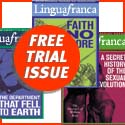 |
 |
 |
||||||||||||||||
|
UB Daily UB Exec Arts & Letters Daily Academic Partners Subscription Services Advertising Information Copyright & Credits 
135 Madison Avenue New York, NY 10016 Phone: 212.684.9884 Fax: 212.684.9879 |

Champion of the Kennedys, passionate advocate of the New Deal, and iconic public intellectual, Arthur Schlesinger Jr. is the dean of liberal historians. Hardly a retiring denizen of the ivory tower, Schlesinger has never shied away from the issues of his day. He played a central role in the development of anti-communist liberalism in the forties and fifties. To his own displeasure, his 1949 work The Vital Center was cited by both Bill Clinton and Newt Gingrich as an inspiration. Now 83, Schlesinger has turned his attention to his personal history with a first volume of memoirs, A Life in the Twentieth Century: Innocent Beginnings, 1917-1950 (Houghton Mifflin). In what amounted to a peer review, Schlesinger's reviewers were mostly fellow historians. The verdicts were wildly divergent-some compared the book to Henry Adams' celebrated autobiography while others were disappointed by Schlesinger's name dropping and reticence about his inner life. James Chace of the New York Review of Books called the A Life in the Twentieth Century "engrossing. " "Schlesinger," Chase enthused, "has given us a memoir that, for all their deep differences in temperament and perception of history, bears with The Education of Henry Adams, the classic American autobiography of an earlier era." The anonymous reviewer for The Economist seconded Chace's comparison, claiming that "if Mr. Schlesinger's second volume matches his first, he will have produced Adams' 20th century counterpart." In The New Republic, Princeton historian (and noted liberal himself) Sean Wilentz called Chace's invocation of Adams "a little ridiculous...it slights Schlesinger as well as Adams." Wilentz explained that where Adams was dour and pessimistic, "Schlesinger, by contrast, is sunny and forthright"; where The Education is a "work of high art," Schlesinger's memoirs are "more prosaic...more tough minded, and more humane." In his peroration, Wilentz highly commended Schlesinger's liberalism, writing that it has "made him steady, immune to hysteria, and unsurprisable." Some of Schlesinger's reviewers were perhaps not so immune to hysteria. Paul Buhle, writing in The Nation, said little about the memoir itself, instead rebuking Schlesinger for his cozy relationship with the power elite and mocking his liberalism. McCarthy apologist Arthur Herman, in the National Review, attacked Schelsinger's politics from the right, but at least managed to get a few words in about the book itself: "we get a datebook summary of Schlesinger's daily life and a dizzy cascade of name dropping...not a single insight or reflective moment breaks the rattle of names and trivial incident...in the end [the book] is a disappointingly, even disturbingly, superficial record." For his part, the historian William Leuchtenburg enjoyed Schlesinger's hobnobbing and name dropping. Writing in The American Prospect, he touched on Schlesinger's wartime role as a bright young intelligence officer in Washington and London, and warmly recalled his own encounters with Schlesinger at anti-communist functions in the late forties. For Leuchtenberg, "the best part of the book is Schlesinger's elucidation of how he came to be the most conspicuous public intellectual of his generation." But Leuchtenberg also noted that the book "does not reveal much about Arthur as a person." He recommended that Schlesinger consider loosening his bow tie when he sits down to write the second volume. Douglas Brinkley, at least, loved the bow-tied version of events, as he made clear in the Los Angeles Times Book Review: "Schlesinger evokes an unquenchable intoxication for living, for constantly gulping down just one more drop of the passion and action of his times. A Life in the Twentieth Century, like his previous 15 books and countless lively articles, offers an indispensable series of engaging portraits of a turbulent age just past by America's most gifted writer on history." Matthew Price |
Get the full story: Our monthly dissertation feature for Contentville brings to light the paper trail left by the good and the great, the famous and the infamous. Learn what you most need to know about most every topic from our regular Barnes & Noble column. 
|
||||||||||||||||
| If you have problems accessing or using any area of this site, please contact us at web@linguafranca.com.
Copyright © 2001 Lingua Franca, Inc. All rights reserved.
|
||||||||||||||||||
